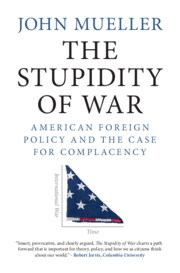Book contents
- The Stupidity of War
- The Stupidity of War
- Copyright page
- Dedication
- Contents
- Figures
- Acknowledgements
- Additional material
- Prologue The Rise of War Aversion and the Decline of International War
- Part I Assessing the Threat Record
- Part II Evaluating Present Threats
- 6 The Rise of China, the Assertiveness of Russia, and the Antics of Iran
- 7 Proliferation, Terrorism, Humanitarian Intervention, and Other Problems
- 8 Hedging, Risk, Arrogance, and the Iraq Syndrome
- Afterword Aversion to International War as an Explanatory Variable
- Appendix: A Sardonic Litany
- Notes
- References
- Index
6 - The Rise of China, the Assertiveness of Russia, and the Antics of Iran
from Part II - Evaluating Present Threats
Published online by Cambridge University Press: 01 March 2021
- The Stupidity of War
- The Stupidity of War
- Copyright page
- Dedication
- Contents
- Figures
- Acknowledgements
- Additional material
- Prologue The Rise of War Aversion and the Decline of International War
- Part I Assessing the Threat Record
- Part II Evaluating Present Threats
- 6 The Rise of China, the Assertiveness of Russia, and the Antics of Iran
- 7 Proliferation, Terrorism, Humanitarian Intervention, and Other Problems
- 8 Hedging, Risk, Arrogance, and the Iraq Syndrome
- Afterword Aversion to International War as an Explanatory Variable
- Appendix: A Sardonic Litany
- Notes
- References
- Index
Summary
Some worry that international peace may some day be punctured either by the rise of China as a challenger country or by excessive assertiveness by Russia backed by its large nuclear arsenal. Each wants to play a greater role on the world stage, but they are both trading states and do not seem to be territorially expansive (except for China on Taiwan), and do not have the wherewithal or, it seems, the ambition, to “run the world.” Indeed, there is a danger of making China into a threat by treating it as such. The dispute between Russia and neighboring Ukraine in 2014 was a unique and opportunistic escapade that proved to be costly to the perpetrators. Russian cybergeek interference in the 2016 US presidential election scarcely constituted a security threat: election fake news simply became higher and deeper. China, Russia, and Iran may present some “challenges” to U.S. policy, but none really presents a palpable security threat requiring large standing forces. Indeed, all three seem to be descending into stagnation. The current “new Cold War,” then, is quite a bit like the old one: an expensive, substantially militarized, and often hysterical campaign to deal with threats that do not exist or are likely to self-destruct.
- Type
- Chapter
- Information
- The Stupidity of WarAmerican Foreign Policy and the Case for Complacency, pp. 141 - 167Publisher: Cambridge University PressPrint publication year: 2021

